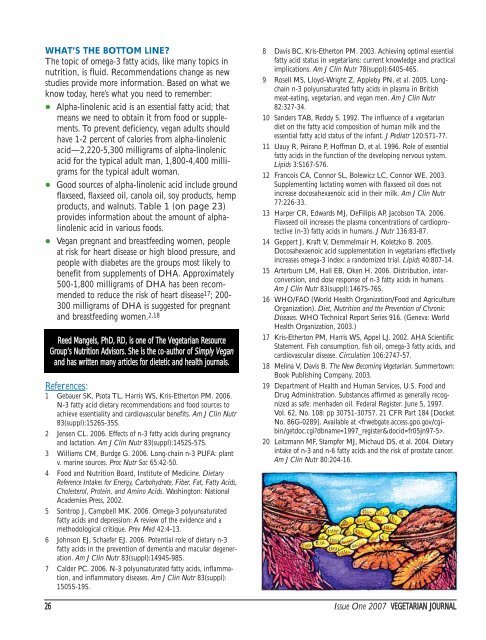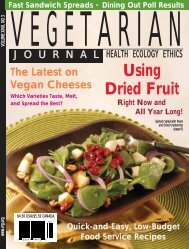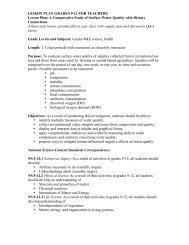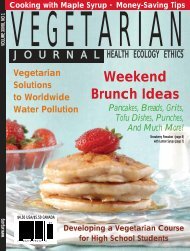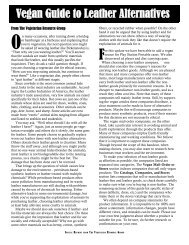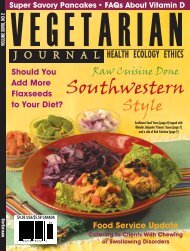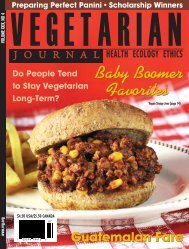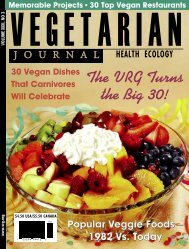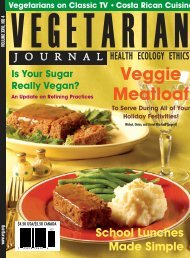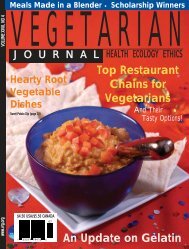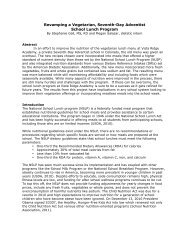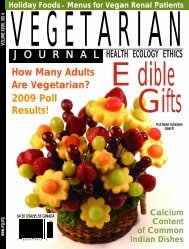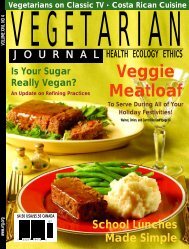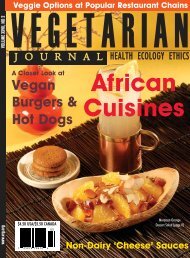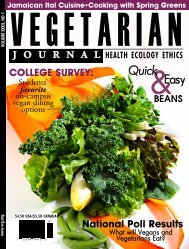Vegan Thickeners - The Vegetarian Resource Group
Vegan Thickeners - The Vegetarian Resource Group
Vegan Thickeners - The Vegetarian Resource Group
You also want an ePaper? Increase the reach of your titles
YUMPU automatically turns print PDFs into web optimized ePapers that Google loves.
WHAT’S THE BOTTOM LINE?<br />
<strong>The</strong> topic of omega-3 fatty acids, like many topics in<br />
nutrition, is fluid. Recommendations change as new<br />
studies provide more information. Based on what we<br />
know today, here’s what you need to remember:<br />
• Alpha-linolenic acid is an essential fatty acid; that<br />
means we need to obtain it from food or supplements.<br />
To prevent deficiency, vegan adults should<br />
have 1-2 percent of calories from alpha-linolenic<br />
acid—2,220-5,300 milligrams of alpha-linolenic<br />
acid for the typical adult man, 1,800-4,400 milligrams<br />
for the typical adult woman.<br />
• Good sources of alpha-linolenic acid include ground<br />
flaxseed, flaxseed oil, canola oil, soy products, hemp<br />
products, and walnuts. Table 1 (on page 23)<br />
provides information about the amount of alphalinolenic<br />
acid in various foods.<br />
• <strong>Vegan</strong> pregnant and breastfeeding women, people<br />
at risk for heart disease or high blood pressure, and<br />
people with diabetes are the groups most likely to<br />
benefit from supplements of DHA. Approximately<br />
500-1,800 milligrams of DHA has been recommended<br />
to reduce the risk of heart disease 17 ; 200-<br />
300 milligrams of DHA is suggested for pregnant<br />
and breastfeeding women. 2,18<br />
Reed Mangels, PhD, RD, is one of <strong>The</strong> <strong>Vegetarian</strong> <strong>Resource</strong><br />
<strong>Group</strong>’s Nutrition Advisors. She is the co-author of Simply <strong>Vegan</strong><br />
and has written many articles for dietetic and health journals.<br />
References:<br />
1 Gebauer SK, Psota TL, Harris WS, Kris-Etherton PM. 2006.<br />
N-3 fatty acid dietary recommendations and food sources to<br />
achieve essentiality and cardiovascular benefits. Am J Clin Nutr<br />
83(suppl):1526S-35S.<br />
2 Jensen CL. 2006. Effects of n-3 fatty acids during pregnancy<br />
and lactation. Am J Clin Nutr 83(suppl):1452S-57S.<br />
3 Williams CM, Burdge G. 2006. Long-chain n-3 PUFA: plant<br />
v. marine sources. Proc Nutr Soc 65:42-50.<br />
4 Food and Nutrition Board, Institute of Medicine. Dietary<br />
Reference Intakes for Energy, Carbohydrate, Fiber, Fat, Fatty Acids,<br />
Cholesterol, Protein, and Amino Acids. Washington: National<br />
Academies Press, 2002.<br />
5 Sontrop J, Campbell MK. 2006. Omega-3 polyunsaturated<br />
fatty acids and depression: A review of the evidence and a<br />
methodological critique. Prev Med 42:4-13.<br />
6 Johnson EJ, Schaefer EJ. 2006. Potential role of dietary n-3<br />
fatty acids in the prevention of dementia and macular degeneration.<br />
Am J Clin Nutr 83(suppl):1494S-98S.<br />
7 Calder PC. 2006. N-3 polyunsaturated fatty acids, inflammation,<br />
and inflammatory diseases. Am J Clin Nutr 83(suppl):<br />
1505S-19S.<br />
8 Davis BC, Kris-Etherton PM. 2003. Achieving optimal essential<br />
fatty acid status in vegetarians: current knowledge and practical<br />
implications. Am J Clin Nutr 78(suppl):640S-46S.<br />
9 Rosell MS, Lloyd-Wright Z, Appleby PN, et al. 2005. Longchain<br />
n-3 polyunsaturated fatty acids in plasma in British<br />
meat-eating, vegetarian, and vegan men. Am J Clin Nutr<br />
82:327-34.<br />
10 Sanders TAB, Reddy S. 1992. <strong>The</strong> influence of a vegetarian<br />
diet on the fatty acid composition of human milk and the<br />
essential fatty acid status of the infant. J Pediatr 120:S71-77.<br />
11 Uauy R, Peirano P, Hoffman D, et al. 1996. Role of essential<br />
fatty acids in the function of the developing nervous system.<br />
Lipids 3:S167-S76.<br />
12 Francois CA, Connor SL, Bolewicz LC, Connor WE. 2003.<br />
Supplementing lactating women with flaxseed oil does not<br />
increase docosahexaenoic acid in their milk. Am J Clin Nutr<br />
77:226-33.<br />
13 Harper CR, Edwards MJ, DeFilipis AP, Jacobson TA. 2006.<br />
Flaxseed oil increases the plasma concentrations of cardioprotective<br />
(n-3) fatty acids in humans. J Nutr 136:83-87.<br />
14 Geppert J, Kraft V, Demmelmair H, Koletzko B. 2005.<br />
Docosahexaenoic acid supplementation in vegetarians effectively<br />
increases omega-3 index: a randomized trial. Lipids 40:807-14.<br />
15 Arterburn LM, Hall EB, Oken H. 2006. Distribution, interconversion,<br />
and dose response of n-3 fatty acids in humans.<br />
Am J Clin Nutr 83(suppl):1467S-76S.<br />
16 WHO/FAO (World Health Organization/Food and Agriculture<br />
Organization). Diet, Nutrition and the Prevention of Chronic<br />
Diseases. WHO Technical Report Series 916. (Geneva: World<br />
Health Organization, 2003.)<br />
17 Kris-Etherton PM, Harris WS, Appel LJ. 2002. AHA Scientific<br />
Statement. Fish consumption, fish oil, omega-3 fatty acids, and<br />
cardiovascular disease. Circulation 106:2747-57.<br />
18 Melina V, Davis B. <strong>The</strong> New Becoming <strong>Vegetarian</strong>. Summertown:<br />
Book Publishing Company, 2003.<br />
19 Department of Health and Human Services, U.S. Food and<br />
Drug Administration. Substances affirmed as generally recognized<br />
as safe: menhaden oil. Federal Register. June 5, 1997.<br />
Vol. 62, No. 108: pp 30751-30757. 21 CFR Part 184 [Docket<br />
No. 86G-0289]. Available at .<br />
20 Leitzmann MF, Stampfer MJ, Michaud DS, et al. 2004. Dietary<br />
intake of n-3 and n-6 fatty acids and the risk of prostate cancer.<br />
Am J Clin Nutr 80:204-16.<br />
26 Issue One 2007 VEGETARIAN JOURNAL


